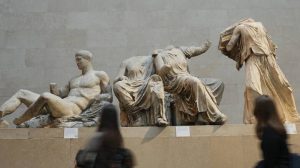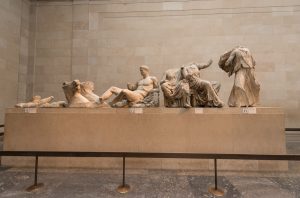Greece is one step closer to reaching an agreement on the Parthenon Marbles with the British Museum, according to British sources with knowledge of the discussions currently underway, commenting on the developments set in motion by the stance of the new Labour government and the constant leaks made to the British press.
Once again, the Times of London argued in favor of the reunification of Pheidias’ sculpted masterpieces, underscoring the fact that the government has “opened the door to a loan of the sculptures to Greece”, and referred to “progress” in the negotiations.
The Daily Telegraph noted that “the government has hinted it could accept a loan agreement for the Elgin Marbles to be returned to Greece”.
According to the Daily Mail, Labour “has hinted at backing for the Elgin Marbles being sent on long-term loan to Greece”.
Yet another Fleet Street newspaper, the Daily Express, claimed that British Prime Minister Keir Starmer is “set to hand Greece the Elgin Marbles as he moves to cosy up to EU partners,” having “softened Britain’s stance on ownership of the Elgin Marbles”.
Change of Stance on Parthenon Marbles
The Times chose to assign particular weight to the matter, publishing the story on page three of Monday’s print edition. At the same time, the Times published an editorial—the fourth in a row since January 2022, when the paper made its “historic” pivot —arguing in favor of the Greek claim.
Citing the Labour government’s initial position on the issue—which was revealed by TA NEA last Saturday—the leading British newspaper praises London’s “change of stance”.
“It is the statues’ status as exquisite artistic artifacts, rather than arid disputes about the legal status of a 200-year-old letter of permission from the Sultan of the Ottoman Empire, that ought to guide their care and safekeeping today”, the flagship British newspaper states in its editorial, urging the parties involved to focus on the substance of the case.
And what is that? “Other relics from the Acropolis are now displayed at the Acropolis Museum, an institution built for the purpose, and there is obvious merit in displaying all these items together”, the article stresses. “The interests of art lovers would therefore be best served by a loan of the marbles to Greece”, the Times continues. “They could then be displayed in Athens without raising technical arguments about ownership that would achieve little except lining the pockets of lawyers.”
The newspaper refers to the statement made last Friday by the British Culture Minister. “Chris Bryant said that loaning the marbles is a ‘matter for the trustees’ of the British Museum, and noted that George Osborne, the chair of the museum, is seeking a ‘constructive partnership’ with Greek ministers”.
The article notes that this represents “a change of tone from the position of the last government, which indulged itself in a public diplomatic spat last year when the Greek prime minister mentioned the marbles in a media interview.”
The editorial ends: “It is a step in the right direction, towards an arrangement that would promote the appreciation of antiquity, and Britain’s standing among its partners.”
A Loan, but…
An article in the same newspaper entitled “Labour opens door to loan agreement with Greece for Elgin Marbles” attempts to link the return of the Parthenon Sculptures with the new British Prime Minister’s expressed desire to seek a closer relationship with the European Union.
“There are now hints that Downing Street is considering casting the Elgin Marbles in a new role—as ambassadors in an international charm offensive”. Still, both the British government and the publications in the vigorous UK press clearly refer to a ‘loan’ of the incomparable friezes and sculptures, which successive Greek governments have rejected. The same sources note, however, that “what is temporary today may become permanent tomorrow…”
-Although commonly referred to as the ‘Elgin Marbles’ in the United Kingdom, Greece and a growing segment of international public opinion insist on the more proper Parthenon Marbles.




